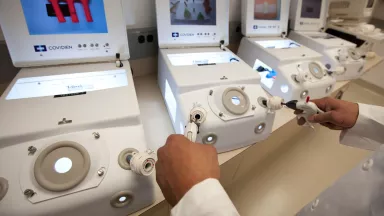Orthopedic Oncology: General Questions
We treat both benign (non-cancerous) and malignant (cancerous) musculoskeletal conditions, including bone and soft-tissue tumors, in both pediatric and adult patients.
Not necessarily. Although we treat patients with various malignancies, many of our patients do not have cancer.
Generally, your first appointment with the surgeon will involve an evaluation that takes into account your medical history, current symptoms and an examination of the injured area. If X-rays are required, they can be taken the same day. In some cases, additional tests may l be recommended and, once authorized, can be scheduled for a later date.
Any relevant medical information, including diagnostic reports and images, will help us better evaluate your condition. If you have these available as digital files, please bring them with you to your first visit.
Additionally, please bring the following:
- Insurance card
- Photo ID
- Outside medical records
- Outside slides with pathology reports
- Referring physician contact information
- Primary care provider contact information
- Pharmacy contact information
Yes. Please bring all outside imaging as digital files, along with a written report for all pertinent studies.
Please plan to arrive at least 15 minutes before your scheduled appointment to allow for the registration and insurance verification process. We understand staying on schedule is important to our patients, and your early arrival helps ensure we can see all our patients in the timeliest manner possible.
While you might have made an appointment with one provider, please know that we work together as a large multidisciplinary team to provide our patients with comprehensive care. Depending on your particular condition, you may meet with other specialists during your first visit to ensure the most complete evaluation possible.
The duration of your visit will depend on the complexity of your condition. We recommend allotting ample time for your appointment to ensure you are not late for other planned engagements.
After obtaining authorization for any necessary studies and tests, we will call you to schedule the exam. Your follow-up appointment will also be scheduled so that we can review and discuss your imaging results with you.
We have many imaging centers across Montefiore Einstein locations. We try our best to accommodate patient preferences when scheduling these appointments.
Generally, we prefer scheduling all imaging and diagnostic testing at Montefiore Einstein to ensure high-quality exams and to help facilitate immediate results. Exceptions can be made on a case-by-case basis.
In general, we discuss results in person to ensure clear communication and avoid misunderstandings. In-person follow-ups also allow us to show patients imaging details, which often helps them better understand their diagnosis and make more informed treatment decisions. In rare instances, when travel is not possible, exceptions can be made.
Montefiore Einstein records and imaging can be obtained as digital files upon request from the medical records office or through your patient portal on MontefioreMyChart.
Follow-up appointments dependent upon your condition and surgery. Generally, patients follow up more frequently prior to and immediately after surgery; however, post-operative care is tailored to a patient’s individual needs. Please consult your surgeon for more specific details.
Insurance policies differ from patient to patient, and coverage will depend on both the procedure and your individual policy. The surgeon’s office will always obtain authorization in advance of any surgical procedure; however, we advise you to speak with your insurance representative to discuss patient responsibility, co-pays and other important coverage details.
If there changes to your insurance coverage are due to occur prior to or near the date of your surgery, please notify us immediately. Authorization, which can take time, may need to be obtained from your new insurance company. Failure to inform us of these changes could result in the cancellation or postponement of your surgery.
Yes. Generally, there are a number of individuals who can assist you with forms and paperwork. Often, it is best to bring these materials to your surgeon’s office before surgery. Please consult your surgeon for specific instructions.
Orthopedic Oncology: Preparing for Your Surgery
Surgery is an invasive procedure that carries inherent risk. Prior to obtaining your written consent, your surgeon will discuss the surgery’s risks, benefits and alternatives. Risks related to anesthesia will be addressed by a member of the anesthesia team. Please speak with your surgeon or a member of their team if additional clarification is necessary.
Preparing for surgery is, to some extent, personalized and will depend on the procedure being performed as well as your medical condition. Some patients will need to obtain medical clearance from their primary care provider prior to surgery. On occasion, additional clearance from relevant specialists will be required to ensure patient safety. Preoperative testing—like blood work, electrocardiograms (EKGs), urine tests and chest X-rays—may also be necessary. Your surgeon will direct you further in advance of surgery.
Please do not eat or drink after midnight on the evening before your surgery. Consuming food or liquids prior to anesthesia can be dangerous and, for safety reasons, may result in the postponement or cancellation of your procedure. If you have been instructed to take certain home medications on the morning of surgery, it is safe to do so with a sip of water. Pediatric patients may be allowed to have clear liquids, such as water, up to three hours prior to surgery. Milk and other non-clear liquids cannot be consumed after midnight on the evening before surgery. Please speak with your surgeon or a member of their team if additional clarification is necessary.
It depends. There are medications that need to be continued the morning of surgery and there are medications that must be discontinued. Prior to surgery, our nurses will advise which medications you should or should not take before your procedure. Please speak with your surgeon or a member of their team if additional clarification is necessary.
If you have digital files of your preoperative imaging, please bring them with you on the day of surgery. In addition, it is helpful to bring a list of medications you are currently taking. We also recommend you bring something to read or occupy yourself with while you wait. For your own safety, we require that a friend or family member accompany you home following the surgery.
Yes. Please leave any jewelry, watches or other valuables at home for safekeeping. Although cell phones and clothing are stored in locked storage during surgery, we strongly advise against bringing valuables and other non-essentials with you.
Surgery for all adult patients will take place at the Montefiore Einstein Moses Campus, which is located at 111 East 210th Street, Bronx, NY 10467. On the day of your surgery, you will check in with Ambulatory Surgery, which is located on the third floor of the Silver Zone/Foreman.
Surgery for all pediatric patients will take place at the Children’s Hospital at Montefiore Einstein (CHAM), which is located at 3415 Bainbridge Avenue, Bronx, NY 10467. On the day of your surgery, you will check in with Ambulatory Surgery, which is located on the third floor of CHAM.
In some instances, your care will be provided at one of the other surgical sites. Prior to surgery, your surgeon’s office will provide you with specific instructions on where to go and when to arrive.
Generally, patients are required to check in one-and-a-half to two hours prior to surgery. The night before surgery, our staff will call to inform you what time to arrive. If surgery is scheduled for a Monday, you will be contacted on the Friday before surgery. If surgery is scheduled following a national holiday, you will be contacted on the last day the hospital is open before your surgery. If you do not receive a call by 4:00 p.m. on that day, you should contact your surgeon’s office or the Ambulatory Care Registration at 929-263-3477, as directed.
Orthopedic Oncology: After Your Surgery
Post-operative hospital stays vary from patient to patient and depend on the procedure performed, as well as other variables. Your surgeon will discuss the anticipated post-operative management plan that is most appropriate for you.
Pain medication is often helpful following surgery but is not always necessary. If medication is required, your surgeon will provide you with a prescription. As most prescriptions are electronically submitted directly to the pharmacy, you will be asked to provide your pharmacy’s contact information in advance.
Post-operative care varies from patient to patient, and specific instructions depend on the procedure performed, as well as other variables. Generally, showers are permitted in the early post-operative period, but your surgeon will likely instruct you to keep the wound clean and dry. Please speak with your surgeon or a member of their team if additional clarification is necessary.
Physical therapy and rehabilitation are frequently ordered after surgery to help maximize a patient’s functional outcomes. Your need for physical therapy or rehabilitation depends largely on the procedure performed and the nature of your condition. Please speak with your surgeon or a member of their team if additional clarification is necessary.
Post-operative care and follow-up visits vary from patient to patient and depend upon the procedure performed as well as other variables. Your post-operative appointment will be arranged either prior to surgery or upon discharge. Please speak with your surgeon or a member of their team if additional clarification is necessary.
Follow-up appointments depend on the nature of your condition and the treatment provided. Please consult your surgeon for more specific details.
Doctors are not able to clear patients for driving. This is a decision that must be made by patients when they feel safe and capable. Driving while using narcotic medications, such as prescription pain medications, is dangerous and should not be attempted under any circumstance. Additionally, we recommend that patients refrain from driving if they are experiencing any substantial discomfort that could contribute to or result in an accident. While there is no specific law against driving with a dressing or a cast, we strongly discourage it. Your safety and the safety of others are of paramount importance.
Return to work varies from patient to patient and is dependent on a host of patient-specific factors, including the type of work you do and the type of surgery you are having. Please consult your surgeon for more specific details.
Physician Referrals
Montefiore Einstein embraces a collaborative approach.
If you have a patient who could benefit from our services, please reach out.
718-920-2060
Schedule a Visit
Have a general question or concern?
We’re available to help you by phone or email.
• 718-920-2060 • orthofeedback@montefiore.org






